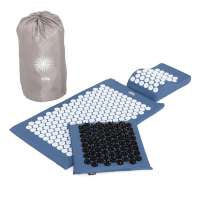
In today's hectic and stressful world, many people are seeking ways to calm their minds and find inner peace. One method is meditation.
Meditation can help you reduce stress, improve your concentration, and promote your mental well-being. However, getting started can be a challenge for many people who don't know where to begin.
In this blog article, we will provide an overview of what meditation is and how you can start practicing it to bring more inner peace and tranquility into your life.
-
What is Meditation?
-
Benefits of Meditation
-
Your First Session
-
Obstacles and Tips for Beginners
1. What is Meditation?
Meditation - It sounds like an abstract concept that is difficult to understand for many. But in reality, meditation is a very concrete practice that aims to calm the mind and quiet the thoughts. Originally, meditation was practiced in various cultures and traditions, including India, Tibet, China, and Japan. There are many different types of meditation techniques that vary in origin and purpose.
One of the most well-known forms of meditation is called "mindfulness meditation," where the focus is on the present moment and allowing thoughts or emotions to simply pass by. Another common technique is "transcendental meditation," where one focuses on a specific mantra or sound to calm the mind and dive deep into meditation.
Although the various types of meditation techniques can differ, there are also many common elements. Typically, they involve a combination of breathing exercises, body postures, and concentration techniques to focus and calm the mind. Some meditation techniques also include visualization, where one focuses on an image or a place, for example.
2. Benefits of Meditation
One of the most valuable benefits of meditation is stress reduction and improvement in emotional health. In our hectic and demanding world, we are often overwhelmed by stress and pulled in different emotional directions. The practice of meditation allows us to find a calm harbor amidst the storm.
By calming our minds and focusing on the present moment, the tensions in our body and mind dissolve. We face stress with a serenity that enables us to think more clearly and respond appropriately to challenges. At the same time, we develop a deeper understanding of our emotions and learn to lovingly accept and let them go. Our emotional well-being is strengthened, and we find an inner peace that supports us in every situation.
Additional benefits include:
-
Enhanced concentration and attention: Through the practice of meditation, we can improve our ability to concentrate and sharpen our attention. This can help us be more focused and productive, whether in work tasks or daily life.
-
Promotion of creative abilities: Meditation can stimulate creativity and support the unfolding of our creative potential. By calming our minds and focusing on the present moment, we open ourselves to new ideas, inspiration, and innovative approaches.
-
Improved physical health: Studies have shown that meditation can have positive effects on the body. It can lower blood pressure, strengthen the immune system, improve sleep, and promote overall physical well-being.
-
Promotion of mindfulness and self-awareness: Meditation supports the development of mindfulness, which means being consciously present in the current moment and perceiving experiences without judgment. This can lead to a deeper understanding of ourselves and our surroundings, as well as better self-acceptance and increased self-awareness.
-
Enhancement of relationships: By regularly meditating, we can also improve our interpersonal relationships. Meditation promotes empathy, compassion, and positive interpersonal interactions, which can lead to deeper connections with other people.

3. Your First Session
Now it's time to put theory into practice. Here's a guide you can use for your first meditation session:
Find a Quiet Place
Choose a location where you can be undisturbed and that offers a calm atmosphere. This can be a dedicated meditation room, your bedroom, or another private space in your home.
Choose a Comfortable Position
Sit on a chair or on the floor in an upright yet relaxed position. If sitting on a chair, keep your feet flat on the ground. Cross your legs in a cross-legged or lotus position if sitting on the floor. Keep your back straight but not tense. Place your hands relaxed on your thighs or gently in your lap.
Close Your Eyes
Begin your meditation by gently closing your eyes. This helps minimize external distractions and allows you to focus on your inner experience.
Direct Your Attention to Your Breathing
Shift your attention to your breath. Feel the natural flow of inhaling and exhaling. Notice how your body rises and falls with each breath. Focus on the sensations associated with your breathing.
Here are some general guidelines that can help:
-
Natural breathing rhythm: Let your breath flow naturally without controlling or forcing it. Simply observe the natural rhythm of your breath as it flows in and out on its own.
-
Even breathing: Try to maintain a steady and calm breath. Some people find it helpful to inhale and exhale for a similar duration, such as inhaling for 3-4 seconds and exhaling for 3-4 seconds.
-
Deep breathing: Aim to breathe deeply into your abdomen rather than shallow and superficial breathing. Feel your abdomen expand on the inhale and contract on the exhale.
Stay in the Present Moment
During meditation, your mind may drift to thoughts or worries. When this happens, gently bring your attention back to your breath. Accept the arising thoughts without judgment and then let them go. Focus on staying in the present moment.
End the Meditation Gently
After a set amount of time you've determined for your first session (e.g., 5-10 minutes), slowly open your eyes and become aware of your surroundings again. Move gently and feel the effects of the meditation on your mind and body.
Reflect on Your Experience
Take a moment after meditation to reflect on your experience. Notice how you feel and whether there are any changes in your mental state or body perception. If you wish, take notes to record your impressions.
Practice Regularly
To experience the benefits of meditation, it's important to practice regularly. Start with short sessions and gradually increase the duration. Try to schedule time for your meditation every day to develop a consistent practice.
Remember that meditation is a personal journey, and each person has a unique experience with it. Be patient with yourself and let meditation guide you. Over time, you can explore different meditation techniques and develop your own style.

4. Obstacles and Tips for Beginners
Meditation can initially pose challenges for beginners as the mind may be restless and finding it difficult to quiet the thoughts. However, there are some common obstacles you may encounter and proven tips to overcome them and make your meditation practice successful. Here are some points that can help you:
Restless Mind
It's completely normal for the mind to wander and get distracted by thoughts and impressions during meditation. When you notice your mind drifting, gently return to the meditation object, whether it's the breath, a mantra, or another focal point. Accept the thoughts without judgment and let them pass as you bring your attention back.
Tip: Focus on your breathing or another anchor point and gently bring your attention back there whenever the mind wanders.
Impatience
Another obstacle for beginners is impatience. You may expect immediate results or a deep inner calm. However, meditation requires time and patience. It's a gradual practice where the experience unfolds over time.
Tip: Be patient with yourself and don't expect instant mastery. Set realistic goals and allow yourself to enjoy the process without being fixated on the outcome.
Regular Practice
Regular practice is crucial to experience the benefits of meditation. It's not enough to meditate sporadically. Consistency is key to making progress and establishing a deeper connection with your inner peace.
Tip: Establish a fixed schedule for your meditation practice and stick to it. Even if you can only meditate for a few minutes a day, it's better than not meditating at all. Over time, you can gradually increase the duration of your sessions.
Acceptance and Self-Compassion
Be gentle and compassionate with yourself when obstacles arise. Accept that there will be good and bad days and that difficulties are part of the learning process. Avoid criticizing or judging yourself.
Tip: Cultivate an attitude of acceptance and self-compassion. View obstacles as learning opportunities and remember that every beginning comes with challenges.

Congratulations!
You have now learned the basics for a successful meditation session and have been introduced to some obstacles that may arise. It's important to understand that these obstacles are completely normal, and even experienced meditators struggle with them from time to time. The practice of meditation requires patience, perseverance, and above all, regular practice.
Remember that meditation is a personal process that unfolds over time. There is no right or wrong way to meditate, and everyone finds their own path. Be open to new techniques and approaches and explore what works best for you.
If you dedicate yourself to your meditation practice with patience and devotion, you will notice over time how your ability to concentrate improves, stress decreases, and your emotional well-being strengthens. Stick to your practice even when it seems difficult at times, and remember that the true fruits of meditation lie in its continuous practice.
So start your meditation journey today.
-
Find a quiet place
-
Assume a comfortable posture
-
Breathe consciously
-
And let your mind come to rest.
Whether you meditate for just a few minutes a day or practice longer sessions, the most important thing is that you take the first step and give yourself the time you need for your inner peace and well-being.
In a world full of busyness and distractions, meditation can help you create a valuable space of silence and peace in your life. Take advantage of this precious resource to center yourself, reflect, and restore your inner balance.
I wish you joy and success on your meditation journey. May you fully experience the benefits of meditation in your life and find your own inner source of calmness and serenity.
How did you like the article?
With your feedback, we can improve our content.
❤️ Very interesting! - ☺️ Okay. - ☹️ Not interesting.











